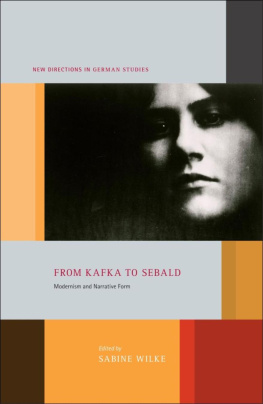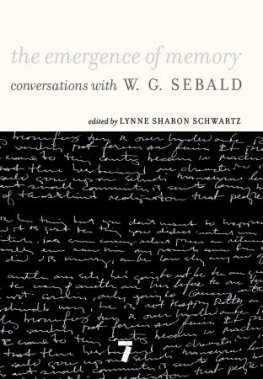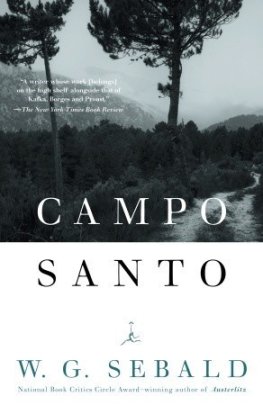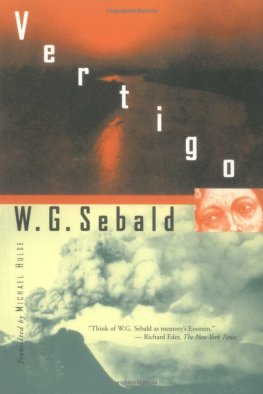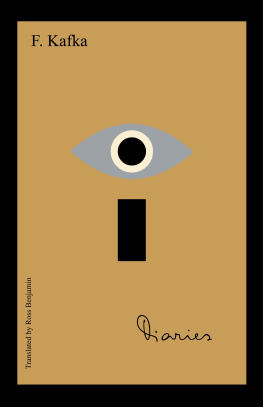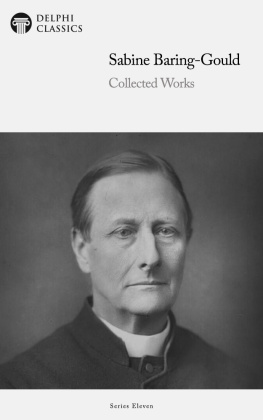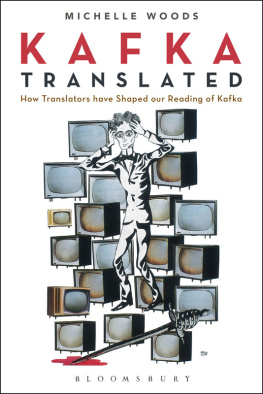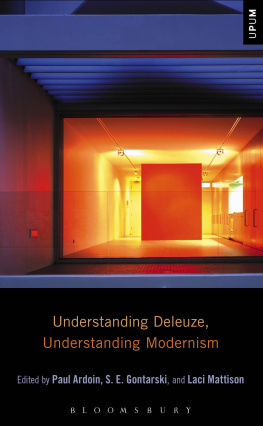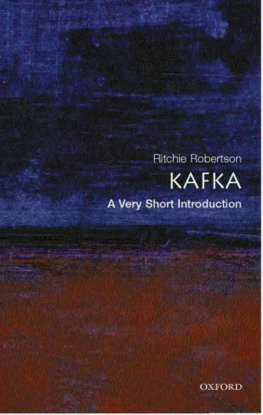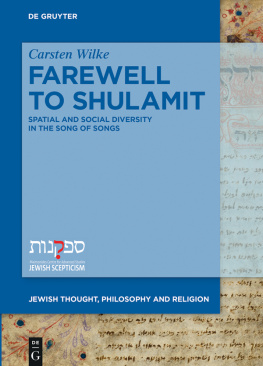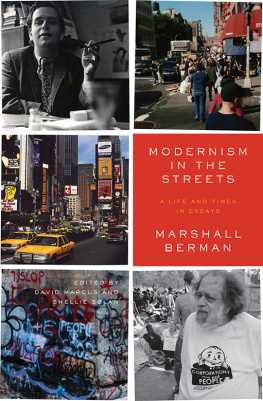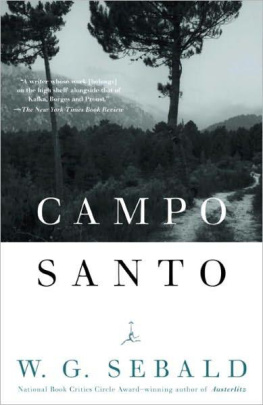Sabine Wilke (editor) - From Kafka to Sebald : modernism and narrative form
Here you can read online Sabine Wilke (editor) - From Kafka to Sebald : modernism and narrative form full text of the book (entire story) in english for free. Download pdf and epub, get meaning, cover and reviews about this ebook. year: 2014, genre: Detective and thriller. Description of the work, (preface) as well as reviews are available. Best literature library LitArk.com created for fans of good reading and offers a wide selection of genres:
Romance novel
Science fiction
Adventure
Detective
Science
History
Home and family
Prose
Art
Politics
Computer
Non-fiction
Religion
Business
Children
Humor
Choose a favorite category and find really read worthwhile books. Enjoy immersion in the world of imagination, feel the emotions of the characters or learn something new for yourself, make an fascinating discovery.
- Book:From Kafka to Sebald : modernism and narrative form
- Author:
- Genre:
- Year:2014
- Rating:4 / 5
- Favourites:Add to favourites
- Your mark:
- 80
- 1
- 2
- 3
- 4
- 5
From Kafka to Sebald : modernism and narrative form: summary, description and annotation
We offer to read an annotation, description, summary or preface (depends on what the author of the book "From Kafka to Sebald : modernism and narrative form" wrote himself). If you haven't found the necessary information about the book — write in the comments, we will try to find it.
From Kafka to Sebald : modernism and narrative form — read online for free the complete book (whole text) full work
Below is the text of the book, divided by pages. System saving the place of the last page read, allows you to conveniently read the book "From Kafka to Sebald : modernism and narrative form" online for free, without having to search again every time where you left off. Put a bookmark, and you can go to the page where you finished reading at any time.
Font size:
Interval:
Bookmark:
Sabine Wilke

Continuum International Publishing Group
A Bloomsbury company
80 Maiden Lane, New York, NY 10038
50 Bedford Square, London, WC1B 3DP
www.continuumbooks.com
Sabine Wilke and contributors 2012
All rights reserved. No part of this book may be reproduced, stored in a retrieval system, or transmitted, in any form or by any means, electronic, mechanical, photocopying, recording, or otherwise, without the permission of the publishers.
Library of Congress Cataloging-in-Publication Data
From Kafka to Sebald : modernism and narrative form / edited by Sabine Wilke.
p. cm.
Includes bibliographical references and index.
ISBN 978-1-4411-2267-4 (hardback : alk. paper) 1. Narration (Rhetoric) 2. German fiction--19th century--History and criticism. 3. German fiction--20th century--History and criticism. 4. Modernism (Literature) I. Wilke, Sabine, 1957
PN3383.N35F76 2012
833.90923--dc23
2012019025
ISBN: 978-1-4411-0936-1
Typeset by Fakenham Prepress Solutions, Fakenham, Norfolk NR21 8NN
The question of narrative form is crucial to the meaning of cultural artifacts. Unless we carefully analyze the position from which a tale is told and how that perspective evolves in complex ways, we have but a hazy grip on how the narrative unfolds, whose point of view we fully or partially share, which perspectives on the narrated events are presented as truths, and how trustworthy the narrator really is, if at all. Scholars who work on narrative theory and analysis concern themselves with this issue: Wayne Booth in his attempt to understand the rhetoric of irony, Robert Scholes who coined the phrase of the fabulator to designate modernist writers of fiction who shy away from direct representation of the surface of reality, Hayden White in his many studies on the narrative discourse of historical reality, to name just a few milestones in the history of narrative among many others.
In terms of historical coverage, From Kafka to Sebald ties together original scholarship on one of the most important German-language writers from the beginning of the twentieth century, Franz Kafka, with scholarship on his contemporaries and on postwar German-language The notion of writing trauma is crucial to an understanding of postwar German-language fiction in the wake of the Holocaust and will be addressed in several of the essays in this volume.
While there are many individual books and articles written specifically on Franz Kafka and his fiction, this collection of essays brings Kafkas work into conversation not only with his contemporaries, fellow Hapsburg intellectuals such as Sigmund Freud, Hugo von Hofmannsthal, Arthur Schnitzler and other writers and artists of the period such as Yvan Goll, but also with contemporary authors that position themselves vis--vis the legacy left by Kafkas writings and in particular his articulations of narrative consciousness. The emphasis in From Kafka to Sebald is on the advancement of narrative form in German-language modernist fiction, not understood as a universal structure, but as the location of an aesthetic and formal struggle with the main issues of the period, with alienation, urban existence, deception, disjointed life experiences, the collapse of the belief in the possibility of an objective articulation of meaning, the role of language, the fictionality of modes of documentation and the presentation of historical material, the fictionality of life and the performance of cultures, and other issues that emphasize the cultural construction of life experiences in modernism. The book approaches the question of narrative via a set of important questions including gender, performance, trauma theory, exile, autobiography and memory in an attempt to establish relevance to ongoing debates. Narrative form in German-language modernist fiction is analyzed from a variety of perspectives that have comparative, deconstructive and historical dimensions. The relevance of the topic of modernism and narrative form rests on the idea that most twentieth-century modernist avant-gardes defined themselves through the critique of narrative as the quintessential form of modern identity and as a category in both aesthetic practice and theory. Narrative theory has experienced a major revival in the course of the last decade, transforming the heritage of structuralist literary narratology into a truly interdisciplinary, transmedial study of narrative practice. The papers collected in this volume investigate how these narrative practices in German-language fiction shape our perception of reality through these lenses.
The essays in this book are dedicated to Richard T. Gray, who turned sixty in July 2012. From Kafka to Sebald is a tribute to the work of this scholar of German literature who has devoted much of his intellectual and critical life to the interpretation of the works of Franz Kafka and, more recently, W. G. Sebald and other contemporary authors of fiction. The essays collected in this volume engage in a conversation with the topics that form the center of Grays intellectual life as a teacher, mentor and scholar. Gray wrote a dissertation on Kafkas aphorisms under the direction of Walter H. Sokel at the University of Virginia. The work was later published as volume 91 in the Studien zur deutschen Literatur with Niemeyer, under the title Rolf Goebel and Clayton Koelb, composed the entries in A Franz Kafka Encyclopedia, an extremely useful and practical tool for students of Kafkas works at all levels.
After a critical study of the science of physiognomics
This volume addresses narratological questions in a variety of formats. The first section on Kafkas Slippages includes two essays that deal with the logic of ministerial action and narrating allegory. In his essay on Ritardando in Das Schlo, Stanley Corngold analyzes the narrative logic of Kafkas novel and shows the complexity faced by any project that tries to map a unified narrative field theory. Corngold sees very little progression in the episodic structure of the work. Particles of Kafkas earlier work are redistributed throughout the novel among various characters and contribute to the failure of assuming a totalizing view of Kafkas narrative that always slips away from itself. In a similar vein, Imke Meyer takes a critical look at Kafkas A Hunger Artist as Allegory of Bourgeois Subject Construction. The outlines of her allegorical reading capture for a moment, in the face of allegorys insistence that the breach between sign and referent cannot be healed, the shifting outlines of one of the texts possible meanings. Meyer contends that Kafka shows us a subject that must consume itself in the very process of its constitution.
The second section deals with Kafka Effects. In his essay on Hofmannsthal after 1918: The Present as Exile, Jens Rieckmann discusses exile in the context of Hugo von Hofmannsthals understanding of the loss of the k.u.k (kaiserlich und kniglichimperial and regal) monarchy and his alienated existence in the Austrian Republic. Rieckmann reads Hofmannsthals artistic crisis as a mode of exile compared to the creative output of his youth. In Yvan Golls Die Eurokokke: A Reading Through Walter Benjamins Passagen-Werk, Rolf Goebel shows that although neither work influenced the composition of the other, Benjamins monumental compilation of citations and reflections on Paris as the capital of European modernity in the age of high capitalism can serve as an interpretive framework for a new reading of Golls rather neglected novel. The comparison of Benjamins and Golls texts helps elucidate the complex range of intellectual responses to the cultural crisis of interwar Europe.
Font size:
Interval:
Bookmark:
Similar books «From Kafka to Sebald : modernism and narrative form»
Look at similar books to From Kafka to Sebald : modernism and narrative form. We have selected literature similar in name and meaning in the hope of providing readers with more options to find new, interesting, not yet read works.
Discussion, reviews of the book From Kafka to Sebald : modernism and narrative form and just readers' own opinions. Leave your comments, write what you think about the work, its meaning or the main characters. Specify what exactly you liked and what you didn't like, and why you think so.

